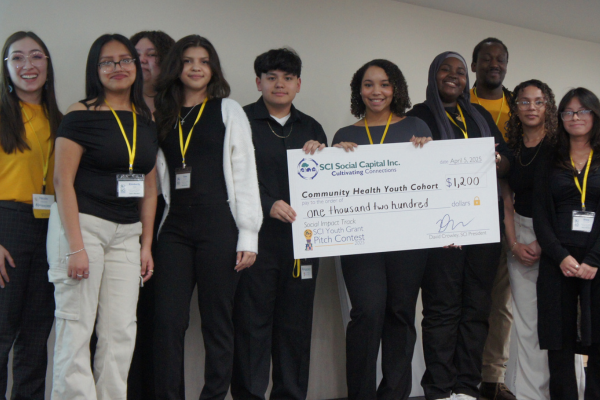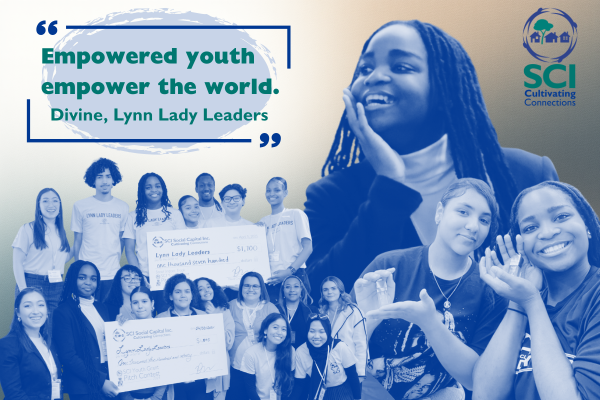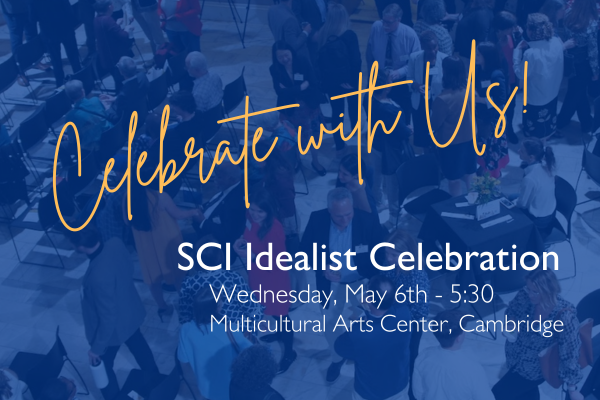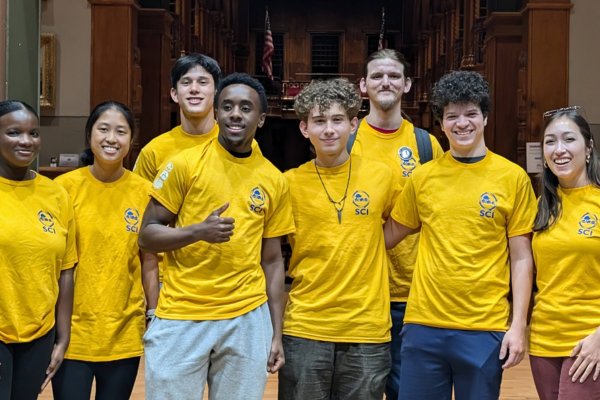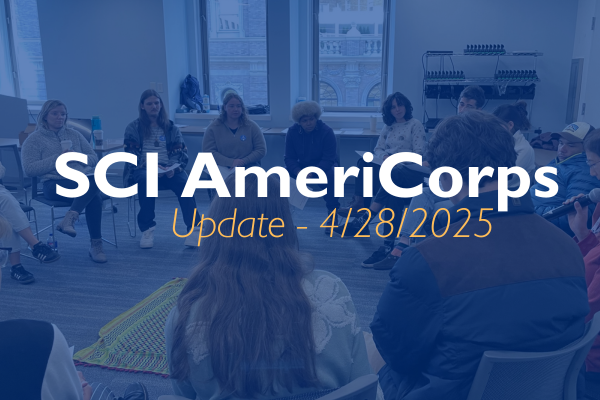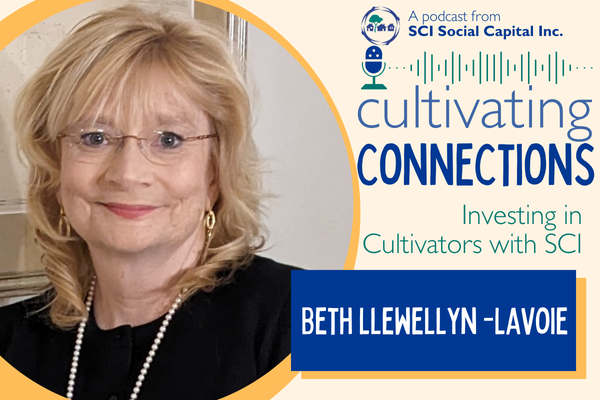Community Building through the Arts with Jean Dolin
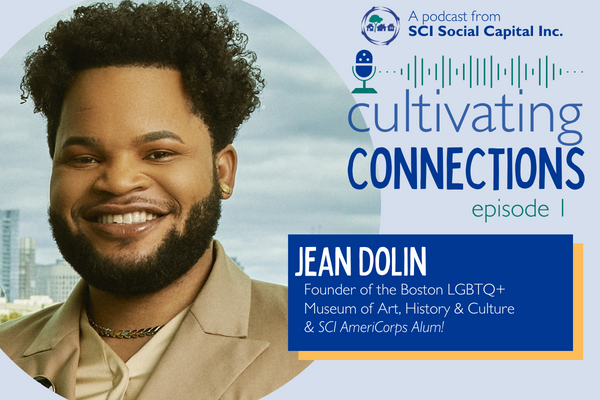
Jean Dolin
Episode Summary – Listen to the full episode below or on Apple and Spotify!
In this episode of the Cultivating Connections podcast, SCI Founder & podcast host David Crowley welcomes Jean Dolin, the visionary founder and president of the newly launched Boston LGBTQ+ Museum of History, Art, and Culture. Delving into Jean’s journey, they explore the origins of his activism, shaped by personal experiences and a deep commitment to community empowerment. This included serving as an SCI AmeriCorps member earlier in his career!
Highlighting projects like Portraits of Pride and Rainbow Tales, Jean discusses the transformative power of the arts in building social capital and driving social change. Jean offers invaluable lessons for aspiring changemakers and underscores the importance of building authentic relationships to have a meaningful impact. He also shares his vision for his latest project, Boston LGBTQ+ Museum of History, Art, and Culture.
Stay tuned – Nora Moreno Cargie‘s interview with David will drop on Thursday, February 29th!
About the Guest
Jean Dolin (He/Him/His), Founder of the Boston LGBTQ+ Museum of Art, History & Culture
Jean will be receiving the first SCI Rising Idealist Award this spring! Join us in celebrating with us on May 2nd!
Jean Dolin is the visionary Founder & President of the newly launched Boston LGBTQ+ Museum of Art, History and Culture. With a passion for celebrating and preserving the rich heritage of the LGBTQ+ community, Dolin has demonstrated exceptional leadership and creative acumen through his innovative curation of spaces and artistic projects. Notably, he has launched Rainbow Tales, an LGBTQ speaker documentary series. And, he has masterminded the Portraits of Pride exhibits, a set of powerful public art installations featuring large-scale portraits that vividly illustrate the vibrant stories and diverse influential leaders within the LGBTQ+ community. Jean is also an Alum of the SCI AmeriCorps program! Read Jean’s full bio.
Episode Notes & Resources
Follow Jean on social media: LinkedIn | Instagram | Facebook
Visit the Portraits of Pride website
This episode was produced by Leah Mulrenan and Sierra Dearns.
About SCI Social Capital Inc.
Our story at SCI centers on strengthening communities by intentionally cultivating connections through inclusive community programs, partnerships, and leadership development.
In June of 2002, SCI was founded by David Crowley. Returning to his hometown of Woburn, he created an organization focused on bringing people together. For two decades, we have taken action, big and small, to respond to what our community needs, in our hometown, and beyond.
The concept of social capital is about the importance of our social networks, and the value of the trust in relationships and communities. SCI addresses the need to increase the social capital of a community and the individuals in it.
SCI’s mission is to strengthen communities by connecting diverse individuals and organizations through civic engagement initiatives.
DAVID: Hello. On today’s show I have is my guest, Jean Dolin, which I’m very excited to delve deep into the conversation with Jean. He is a visionary founder and president of the newly launched Boston LGBTQ+ Museum of History, Art and culture. I think I said that on the right, wrong order. But you can correct us as we get into the conversation. He is also an SC AmeriCorps alum and will be receiving the first ever Rising Idealist Award on May 2nd. Jean, welcome to the Cultivating Connections podcast.
JEAN: Thank you David. Thank you so much for having me. And I’m so excited to be here to be a guest on the podcast. Obviously, I’m a alumni of SCI AmeriCorps and so I’m excited to be here.
DAVID: Excellent, excellent. Well, I like to start a conversation like this, I know some of your background. So I’m curious. You know, you’ve been doing so much activism and I’m very visible with compelling way for a number of years now, but trying to get a sense of where some of this might have started, you’re sort of like want to experience or even a moment that you would say led you into doing the work you are doing today.
JEAN: That’s a great question. I don’t know if I can actually relate to one specific moment or time, but I always say when I’m bored. To Boston in 2012, comedy I came as a teenager, graduated high school, and then I wanted to get myself into college. And so I didn’t know enough about that process. So I had to advocate for myself and learn the structure of college and ultimately learn how to find resources for myself. And because of all that experience, I became the go to person family members who would come into the fray. And as a newly arrived immigrants that I knew would come to to find out how did I do it, and then also give them advice. So that experience really turned me into this community resource person. And then when I got a job at the American Red cross in 2015, I learned of so many different programs and resources and scholarships, and I wanted to learn more about these resources, how people would get those kinds of support, whether as a student or as a family and at the time are still in college. And then it just came to me to do an internship with Senator Warren. So when I did this internship with Senator Warren, I learned even more what a congressional elected official can do for constituent constituent services, even formal advocacy level, what your senator can do for you. And then from that internship is just became a whole thing. I was just going from wall to wall organization to organization and learning as much as I could, and then returning the favor to my community as much as. Possible. I think obviously they’re a little different worlds from campaigns and a little bit of policy and nonprofit organization, social studies organization, advocacy organization. But the common thread among all of those experiences, for me and for the for the organization, has been this commitment of helping others and helping improving other people’s lives. So it’s not a single moment. It’s just been a series of experiences that have led me to to this path and this journey that I’ve been on, and honestly, I’m grateful for it.
DAVID: That’s great, I love that. So it’s kind of like you had that personal kind of had to go through, break some barriers, find some resources yourself, and then not everybody has that instinct to reach out and help the next person along. But now and now, yeah, I love the way you’ve been able leverage your own experience to help others. And I know a couple of specific projects who want to touch upon that you’ve been doing recently. I had the pleasure of checking out your first edition of Portraits and Pride with these magnificent, huge photographs that were displayed throughout Boston Common and highlighting different leaders from really diverse backgrounds within the LGBTQ community. So that was very impressive. And I remember I heard about that project for me before seeing it manifest itself on the comments. So it was so great to see that come to reality. You have. I just was impressed with just the breadth of, you know, support and participation you had. How on a project like that do you go about, you know, going from an idea to really getting so many people involved and behind it?
JEAN: Yeah. That’s another great question. Because because I’m processing all over. And so the way my brain works, I always see the actual destination. So all throughout the year, working on the first Portraits of Pride exhibit involves people who are listening but not know what is a large scale photograph exhibit where we photograph LGBTQ leaders and we print those photos ten feet tall, and we put that in a public space. So it’s really a public art installation that everyone gets a chance to experience and look at and revel in the sense of the community that comes to the project. So I started working on the first one about 2021, and then it took a year for all the pieces to to come together to execute the first one, which David graciously attended in October 2022 in Boston Common and a number of things one. I worked with an amazing photographer, John Huet, whose work I saw and inspired this project. He allowed me to worry about everything else but the photography. I had a sense of calm, knowing that the actual work will come out impeccably and it will be beautiful, but also it will be diverse in the way the photographs were captured and also the stories they were telling visually. But. It’s that also it make him this experience that really refine my my my leadership skill, but my execution, my executive skills, being able to get the permits and get the funding and raise the money and and bring those folks to be photographed and all the project. Right. Because it’s twice the people that only photograph. So I had about 2 or 3 people in mind. And then from there and the list can go in because again, I was doing it in community. I reach out to many community leaders and asking to know that have been in Boston for at least ten years, that I’ve been doing this work of elevating lives, specifically LGBTQ lives, whether through policy, housing, social service, education, art, or even who do you see now in the next ten years could be our leader and people pointing into different leaders to different centers. And and from there reach out to there and some folks were gracious enough to make introduction to folks like Arline Isaacson and Elyse Cherry. And Michael Bobbit was made about a year prior, also as wishing them to see us through the project. So we scheduled a photo shoot journey where to conduct the photo shoot now comes down for the permit for those frames, for the construction, for the opening, and also for the branding. How do we present this? That hasn’t been done before to the public. So that they get it? How do we present it to sponsors so that they they see the value and make financial investment in it? How do we present it to the media so that it gets the peace and the glow, so that there was a project that I really wanna tell me and my skills as a creative, as the leader, but but also as a logistical project as well. So I think the secret sauce would be community, because that’s how I was able to get the leaders to say yes to it. And then also once I’m committed, I’m willing to see through. So even with the challenges of the project, it’s going to the board review meeting with the commission of this city. Had to approve it. I didn’t know that going into it, but all of that worked in the in and then the project came together.
DAVID: Excellent. Well, it’s those skills you developed and experience from that. I’m sure we’ll be serving you well in your next undertaking. So start by just giving us a little high level explanation and vision for your latest project.
JEAN Yeah. So when I again going back to when I first moved to the US, I started learning about the LGBTQ movement, in particular what happened in Massachusetts and some of the pioneering walls this state in the city has played in and advancing the LGBTQ movement, and became a little bit frustrating for me because there was not one institution or a place I could go to learn about that history. Recently, I was just learning about it in bits and pieces. And as someone who at the time of this is still today, who would go to museum all the time because that was my way of learning the culture of America and learning about the community, learning about the people in the history of the country. I’d understood and wondered then, why isn’t it the LGBTQ museum giving that history? But obviously I put that on pause and went into all this work that I’ve done with different institutions until Covid came out and the world shifted and I shifted along with the one with the question, what is it you really wanted to do in the beginning? And for me, that was storytelling, that was telling history and really digging deep into LGBTQ history and say something about this community, who we are, what we’ve built to where we are today and where we can be in the future. Shouldn’t the world of really recognize our humanity and really give us the space and the resources to to live and to thrive? So while at Covid in 2021, I could produce a documentary, Rainbow Tales, featuring LGBTQ leaders talking about what they experienced coming and how that played into the work that they were doing. And then in 2022, I studied and I produced for Portraits of Pride, which was actually a visual storytelling of the community. And so all of these projects were really stepping stone to the idea in the question of why isn’t there an LGBTQ museum in the city? And so with these two projects, the documentary and the first exhibit, I started talking to folks, talking to leaders what a museum would look like, what it would be, what we would tell, and who we would engage in. These conversations provided a lot of insights, lots of ideas, and lots of questions as well as answers. So from there, we established our mission to tell the history of the LGBTQ movement and the state of Massachusetts, to support LGBTQ artists, and then also be the institution that will foster a queer culture in Boston, because we do not have that, and it’s a missed opportunity. So that is our mission. It is to tell the history of the movement in the state. It is to support LGBTQ artists in all regions of the state, and ultimately, that will help foster a queer culture where people are celebrated and visible, not just for 29 days in June, but all 365 all over the year. But also it’s been a journey of securing legal representation. We have (LAW FIRM) which is our law, which is our law firm that is representing us, supporting us in the legal filing, forming a board. We have an advisory council, and we’ve been engaging and having conversations with different stakeholders across the city of Boston, really across the state of Massachusetts. So where we are today, we are a non-profit institution. We currently do not have a space yet, and that is because we are in the middle of a feasibility study. What the feasibility study is doing is look at how much space we will need for our permanent home and how much programming will go in that space, but also how much staff and how much it will cost to operate, and run that space. So once that feasibility study is complete, silence might be around issue or early next year. We will enter this phase of trying to secure and a partnership with the developer so that we can work with them, inserting a space that way. But in the meantime, we’re going to be doing some temporary projects, temporary exhibits, which I’m very excited about. This year alone, we have about three exhibits already scheduled. One of them will open in May and that will celebrate the 20th anniversary of marriage equality. So in 2004, that’s when marriage equality became legal and also took effect May 2004. So we’re celebrating that with an exhibit. The second exhibit will be another portrait of pride, obviously excited about that. And it will feature the plaintiffs of that case from 20 years ago, along with some other influential LGBTQ couples in the region as well. And then the next day, they will honor the 100th birthday of James Baldwin. So for folks who don’t know, James Baldwin was a major writer, activist, Black gay man, openly black gay man who talked about racial justice and race in America. He is considered one of the most talented and important writers of American literature. So are we excited to be able to honor him with an exhibit. Really give us a sense of who he was and why he found inspiration, and how his work is still relevant to our time today. The thing I always say, though, although Baldwin doesn’t have a direct connection or ties to Boston, but he does to the state of Massachusetts, he taught atUMass Amherst for a number of semesters and actually how they are and that I’ve been going along with the curators that will present the record of that exhibit as well. So it’s all coming together, and project is coming up. While in the back, while there’s also more work happening for the long term plan and vision.
DAVID: That’s great. Now, I’ve heard you make several references now to, you know, a couple of common themes I’m hearing, you know, like the role, the arts and these initiatives play in building community. But also I like that way you’re kind of like, there’s the history, the present, but, you know, looking to the future. And I feel like I’d love to hear you talk a little bit more about the role, you see. You know, I think of you as an activist, but you’re clearly grounded in the arts. You know how you see the arts driving both community building and social change seems like that’s foundational to your work.
JEAN: Yeah, absolutely. I mean, I think when we when I think of the arts, I think of whether that is music, whether that is literature, whether it is performance for an actual piece, culture or fine art, a painting or artistry. It just has this unique ability to bring people together. It has this ability to bring people of different creed, different lived experiences, and different races and backgrounds together. And that I have a lot of respect for, because I think we live in a time, especially from the political landscape, where things are so polarize and there’s so much division in our discourse. It’s easier to stay away from each other and not really see and cultivate these connections. So the art can do that for us, can bring people together is something that I ordered. And once it does bring people together, it has the ability to stop conversation, difficult conversation and conversation that can lead to the path of healing collectively from the community standpoint and also force us to ask hard questions who are we? Or who are we being with? Or who can we be in the future as a society or as a group of people? So those are the things I admire about the art, and that is why I have really anchored my work of social justice or social impact into the arts, because it has this special thing. It has this special effect of, you can bring people that are in their 80s and people that are in their teens, They both can collect little pieces, or they both love the same pop artist, or they are singing the same song, or they can go to the same shows, or they enjoy a performance together. And I just admire how the arts cultivate connections and deep connection, community connections. And that’s why I’ve encouraged the I really encouraged into it, and I’m really giving it all I have, because what I learned from my days of working in politics, campaigns, even policy on a small scale, is that it’s really hard to change someone’s politics. It’s really hard to change who they would vote for . Yeah, but it’s easier if you connect with them one on one and they can see it at a personal level. Then they start looking at the bigger picture and saying, I need to make better political decisions. I need to choose. I’m voting for better. Absolutely. I need to vote. Actually, I need to exercise that. Regular people now that are close to me, families and friends and neighbors that don’t have that luxury authority or. You know the lives are in danger or they don’t have access to all the things they should have access to. And so I think I just want to hold on onto that, onto the body because it brings people together and anything can happen. The moment you are able to do that.
DAVID: Yeah. That is so true. I mean, it is very true that I think in our society, you know, we’re in these echo chambers. People tend to just be reinforcing their own views, and we need more spaces and things that bring us together and the arts are definitely a prime candidate. So that’s that that’s great. And James Baldwin is a great example too, of arts using really raising issues and getting people to think up to think about big questions. So that’s, that’s gonna be a great project. Another follow up, you know, as we kind of wind our time down is some of what you’ve said, I’ve already got some nuggets that I think would apply to anyone, whether they’re trying to create a museum like you are or doing something totally different. But from these different endeavors you’ve been involved in, could you pull out maybe a lesson or two that you think would really are something you learned, whether it be because it worked well, or maybe that’s something you’ve learned the hard way and you can help somebody. They’ve got a faster track to success because with a pearl of wisdom from you.
JEAN: Yeah. Wow. So on on the concept of fast track, there is no faster route. Uh, I think that’s the thing I’ve learned. There is no shortcut. And success, then, is not the right pass. The shortcut is to do the work. Maybe once you know what the work is. Commit yourself to doing it and also have clarity about your skills and abilities, what can do and what you cannot do. So all the things you can do, commit to doing them and do them well and do them now. The things you cannot do. Commit yourself to learning about them from different programs, different, you know, training programs, and also bringing people along. If you don’t have that skills, if you don’t have the ability to pull it off when people arms. So like my first advice to commit yourself to do the work because it’s the only shortcut if you really want to get it done, if you want to do it well, you have to do the work. Because what it does when you really do the work, it allows you to build off of. In the long run, you will end up building this ability to take on a lot slower and executing even more efficiently. Because you have gone to these things because you know you’re not used to cooperation, you know the fundraising model, you know, your donors or you know about what will you know about the brand, you know about the presentation, you know about the public relations. So you kind of have to know all of that to understand how your machine operates, but you can decide on whom to focus. On fundraising. But in the back of your mind, you know everything else that is happening and how your fundraising sort of fits into all of these buckets.
And then the second thing I will, I will give as an advice is have a general sense of curiosity about life, about people, about systems and about different sectors. And that’s something I sort of started learning at that internship with Senator Warren, because I had a fellow intern who was studying science, biology, and he prepared for this internship. And the case for his internship was, I don’t know anything about politics, and I want to learn as a, as the future scientist. Right. So even if you an endless space where you want to do science or you want to do technology or AI get a sense of these other fields around you because the higher you go and your goal, the more impact you want to have, the more you will have to reach out to different sectors, right? Yes, I’m in the arts. But there’s a lot of finance involved. There’s a lot of communication and there’s a lot of politics involved. I mean, we are building a wall. We are hoping to build a building and acquire a permanent space in the city of Boston. There’s politics involved with that, and we are truly engaged. And who’s going to support us? So I think it’s a combination of doing the work to be curious about different sectors and different systems and build genuine relationships with people, because my secret sauce, to not just the museum, but also everything else are done has been because they are great people and great managers. I mean, I remember when the idea for the museum was in my head, I reached out to you, David. do it and I don’t know if you remember.
DAVID: I do.
JEAN: I think early on 2022, we had an extensive conversation about what it would look like, what I should be thinking about as a very early stage nonprofit, who we should engage in different conversations. So I think you have to learn how to build a community around you that want to support you in every endeavor. And I think from there you will be able to to learn to see what’s the best path forward. And also and then seeing what works for me may not work for you. What was a challenge for me may not be a challenge for you because everybody is different. We have different experience in different scales. We bring different things to the table. But I encourage you to really know yourself. No one you capable of getting those skills. I mean, a lot of people have been saying, oh, I see you, you blowing out with your successes to see. But I’ll tell you, David, from the time I moved to the U.S., from 2012 and up until 2022, I’ve been in school. That’s always been a training, hands on training. There’s always been a certain type of education that I’m giving myself to build skills and ideas. Building my brain capacity seems equally about what’s the next move, whether it’s political training, campaign training. Yeah, training, all training. And I’m just saying normal education through college. So I encourage you to do that if you want to get something done, if you want to have an impact. But community is your key. Keep that close. develop that. cultivating these connections and really the world will be your oyster.
DAVID: Great, great advice right there. Yeah, sure. That’s inspirational. I do think that piece about curiosity, I see the link between, you know, being curious and also, you know, knowing where you need to grow and you, you are trying to learn, but like you did reaching out to me and many others, you’re connecting and and as you’re having those conversations is a great way to draw people in because you start feeling invested when you’re asked for advice and something to. So I think that’s probably part of the way you’re able to cobble together such a great group of folks from, across a lot of different sectors, for sure.
So just that one piece as we want to as we wind down, I wanted to ask, I mean, we will put, you know, if there are any resource links to your initiatives, we’ll put on our website social capital talk slash podcast. If for somebody driving can write stuff down, you know, if there are a couple places that they should that they should look to find you. If you have a website or say check you out, our social media, where do you recommend? What’s the best way for people to connect?
JEAN: I’m everywhere,on Facebook with the name Jean Dolin and you’ll find me there. Same for LinkedIn. I’m on LinkedIn and I’m building quite a community there, and I’m excited. I lean on that and you can connect with me there. I’m also an Instagram @jeandolinoffical. You can connect with me there. Um, and I will say there’s also in the building, your platform and your brand on social media, because that’s how we be able to connect with some of the people that we may have not had the opportunity to meet in person. So you can run across social media platform and once you follow me, there’s tons of updates you can get for my project. You can also visit my. You can also visit my website JeanDolin.com, and then specifically to the museum, which I’m so excited about. You can follow the museum on LinkedIn. You can follow the website’s, subscribe to our website. The website of the museum is blgbtqm.org/ . So I encourage all of you to to follow to contact me if you have any questions. I’d also like to support. I welcome all of it.
DAVID: Perfect. Well, I know you’re very engaging in person and on social media, so that’s definitely follow. Jean, if you aren’t already the final, I think you’ve kind of summed up some of your advice already, but I did, I did I can give you a heads up. I give you a chance for some parting advice. Of all the pearls of wisdom you have dropped on us for the last 20 or 30 minutes, if you could. Give usfive words or a headline, or five keywords that can be related or unrelated, 1s that are your advice around this idea of how we get more connected and make a difference in our communities?
JEAN: Be committed to do the work of cultivating connections so that you can have impact with your community and in your community. That’s my advice. So be willing to do the work to cultivate connections with your community so that you can have the impact that you want to have in this community.
DAVID: I love that, yeah, that theme of community and doing the work. Yeah, I love that. I like I asked you for the the advice to, uh, how you can get a little bit a fast track to your goal, but you got to do the work.
JEAN: you really have to. They are super powers. They are super powers. And you will feel so much more empowered and better equipped to lead, to lead into execution, to make decisions. Because you will know, at least before all. I know the process. I know this procedure I can make this decision. Whereas if at any point I think anyone will miss any step, that’s when you really don’t have to reach out and not be sure of yourself or your decisions making. And while that’s okay to ask for advice, but you don’t want to get to where people are questioning whether you can lead on these initiatives or not because they are realizing they are some very basic level information or skills or strategy you don’t have. And so the more you can build them, the better serve you in the future. Yeah.
DAVID: Well, this has been great. I think you’ve given us some great information about what you’re working on, which is exciting, but then some takeaway lessons that I think other folks that are current or would be social entrepreneurs and activists like yourself. So thank you so much for joining and sharing some of your wisdom and energy.
JEAN: No thanks to you and thanks to you. I really appreciate this. And because I’ve done so much in the past ten years, there’s this joke in Boston where people don’t really know what I do. Until I announced the museum publicly, it was really hard for folks to figure out which was the which basket to put me in. Right. And so I think this, you know, this episode and this conversation with you, David, will give them a lot of insights into the work that I’ve done, what I’m doing now. And what’s to come in the future. So thank you for having me. I’m excited!
DAVID: We’re excited to see all that, all that’s coming down the pipe. All right.
JEAN: Thank you so much. Thank you guys.

